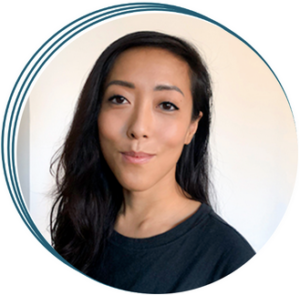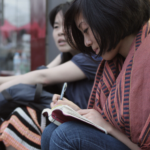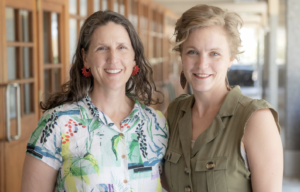 “As ethnographers we can guide conversations and support conflict mediation in ways that do not just further entrench people in their positions.” —Panthea Lee
“As ethnographers we can guide conversations and support conflict mediation in ways that do not just further entrench people in their positions.” —Panthea Lee
In August 2021, we connected with EPIC2021 keynote speaker Panthea Lee—strategist, organizer, designer, and facilitator, and Executive Director of Reboot. Panthea is a pioneer in designing and guiding multi-stakeholder processes to address complex social challenges, with experience in 30+ countries with partners including UNDP, MacArthur Foundation, Luminate, CIVICUS, Wikimedia, Women’s Refugee Commission, and governments and civil society groups at the national, state, and local levels. We were excited to get to know Panthea, learn about her work, and now, share our conversation1 with the EPIC community in advance of her talk.
How did you come to do the work you do now? —Victoria
I am from Taiwan. My family lived there during one of the longest periods of martial law in the world, 38 years. I think a lot about political institutions, the role of the media, the fourth estate, and how we as communities, societies, and cultures condone and/or support forms of extraction and oppression and also enable silences around those forms.
I also think a lot about what it means for us to try and dismantle this logic of extraction, oppression, and silence and dismantle the structures that reinforce these systems and logics…what does it mean for us to dream of equitable structures that honor everyone’s dignity and joy? That is certainly not something I saw growing up.
My journey has shifted as my career has progressed. Early on, I had a more simple understanding of how change happens: services are broken and we just need to fix the services. Then, it was that the services are not going to work if the institutions are broken, so how do we change the institutions? And after that, it was the policies, and now it’s culture. So I’ve had to go further upstream. My view of different actors in the ecosystem has also changed. Whether it’s community groups, activists, corporations, or international agencies. I ask myself, what are their mandates, and who has the right to have which mandates—to set policies or take decisions that will impact millions of lives? What of their history, philosophical orientation, politics, structure enable or hinder them from delivering on that mandate in a just way?
What would you want people who are coming to your talk to know in advance? —Victoria
We’re in a moment of reckoning, which is deeply uncomfortable for many because people in positions of historical privilege are having to do a lot of work grappling with the sort of structures and the assumptions that they have carried and operated within throughout their life. That seems very personal for many folks, like, how could I have not understood?, how could I not have seen this? All the way to denial, like, well that’s not true—I don’t benefit from structural injustice, or, my society is not racist!. We need to depersonalize these issues and take a look at how we are all the products of an extractive, oppressive, greedy system; and until we can take an honest look at that, we are not going to be able to liberate ourselves from that system. We need to assess that system and take the personal out of it.
Biases and assumptions are embedded in all we do, and particularly when you are in positions making decisions that impact the lives of hundreds or millions or billions of people; it is then your responsibility to do that work. It is not about whether you are a good or a bad person, it is about the responsibility and the power that you hold. As ethnographers, we are looking at the human level. Things are not going to change unless humans do that reckoning because the institutions, structure, and systems are designed by humans, are held by humans, and are perpetuated by humans. And so, the analysis, the finger pointing shouldn’t be personal, for it’s structural injustice we are fighting, but we do have to do that personal work if we’re going to succeed in that fight.
Why use ethnography and culture as a framework for approaching and understanding the world? —Victoria
We are in such a crisis of polarization right now that makes it seem near-impossible to hear and to understand each other. I don’t think there is a way out until we grapple with where our individual beliefs came from. For example, in the United States, there has been a lot of head-scratching about Trump voters within left-leaning, mainstream media. I think most of the punditry misses the point. I really admire the work of Arlie Hochschild and Sarah Kendzior on this topic. People have come away reading their books with an understanding of those with whom they do not identify. We have not done that deep ethnographic work in policy settings, to understand deep-rooted belief systems. Instead we try to “sell” policies and candidates to people. Ethnography is really essential because more and more, work around democracies relies on quantitative data, which tells you what people may support but it never tells you why. Why are people feeling the way that they are? Or, why are some people susceptible to recruitment by neo-confederate groups? Understanding these questions is really essential if we are going to bridge these seemingly impossible divides at the heart of our democracies and our world.
So now shifting to talk about the limits of ethnographic practice, without giving away the juice of your talk, why does this topic matter? Why do people need to hear what you have to say about this? How is ethnography limited in this capacity? —Connie
Ethnography is very helpful, and we have to question or reckon with its histories and biases. When we are melding ethnography with design practice, we are gathering the stories, the data, and feeding it back up to the decision makers who then make decisions about how to improve people’s lives based on this data. All that is rooted in a politics of empathy, which assumes that if we just tell the right story, then people in charge will do the right thing. And history shows that this is false. I want to challenge this notion and also ask, How are we in service to communities that have been historically oppressed? Do we want to challenge some of the fundamental underlying logics of ethnography? If we think about our positionality, our place and access, then operating from a place of empathy also essentially upholds existing power structures. Using Aruna DeSouza’s framing, empathy can enable those in a position of power to maintain their supremacy and to dole out justice as a matter of individual kindness. Instead ask: how do ethnographers work towards a politics of solidarity with communities that have been marginalized? How do we use our access, our ability to sit in the boardrooms towards that end?
How and why will ethnographic methods and practice be important in the next 5 years, 10 years, the next 50 years? How will things be different in 50 years if ethnographic practice is used effectively in industry, in development, or elsewhere? —Connie
One of the biggest challenges to whether and how we are able to win a world that honors all our dignity and joy is how we approach and resolve conflicts. Right now, the ways that we are solving conflict are incredibly unhealthy. We are often going into conflicts without an awareness of both ourselves and also the other. We are being very ungracious in our approach to conflict. We are often fixated on our position and our way of thinking and are not open to understanding where someone else is coming from.
We are seeing this inability to solve conflict and fixation on positions end badly. For example, in a lot of activism right now we are attacking politicians and corporate elites in public, via mainstream and social media, so they will come to the negotiating table as a concession; they will give us something. When they do, we say we have won the policy goal. But there are a hundred ways to block it in implementation.
And then, you also have violence. The January 6th insurrection at the Capitol is an example of different ways that folks are trying to address conflict. We do not have good processes for dealing with that right now…or to resolve conflicts in ways that are healthy, restorative, and liberating. Ethnography is going to play a really important role because we’re going to have to really grapple with the provenance and the lineage of our beliefs and how we think about ourselves in relation to other people.
As ethnographers we can guide conversations and support conflict mediation in ways that do not just further entrench people in their positions. Whether it is climate, migration, famine, we have the solutions. The technical solutions exist. The problem is that people are not willing to concede or to work together on what we know works. We need to un-knot that relational knot and I think ethnography can play a huge part in helping us do that.
Do you have any examples of folks doing inspirational work to help address the polarization and negotiate conflict that you mentioned? —Connie
An example that I feel really proud of was a presidential initiative, under Obama, to protect the rights of activists and human rights defenders in authoritarian regimes. The United States Government, the Swedish Government, and private foundations came together to work on this. The first gathering was an assembly where we had around 60 people from 30 different countries and organizations working on anything from LGBTQI rights in Uganda to freedom of information in Azerbaijan.
The folks in charge thought that this is going to be a pretty technical design exercise: what are the problems? How do we analyze it? I wasn’t able to do sort of the ethnographic work with all the folks that were coming, but we spent a lot of time doing the type of deeper engagement and it ended up being a three year process. So I ended up knowing all these stakeholders pretty well by the end of it. We asked: Where are you coming from? What do you believe in? Why are you in the space? What are the intersection points between you and others? What are the beliefs that ground us all in this work? Understanding all that before we brought folks together—to design something that serves them all, yes, but also to essentially advocate for why their issue, their region, etc., was more important and thus why they needed more resources—enabled the conversations to shift from a place of what are the checklist of things we can do to protect our own work, to how do we find commonality and solidarity with another? This type of process requires an ethnographic sensibility and a facilitator to come and reflect the group’s things back to them.
Workshop participation nowadays is a professional skill. How can you write on a Post-It note? Can you deliver your statement in the 30 seconds allotted for you to like make a big point about something? And I think people, especially folks from backgrounds that do not have that training or are from historically marginalized backgrounds arguably show that when they go to Town Hall meetings, for example, they actually leave feeling less like they want to participate, because they don’t know the professional code. So how do you get people to share and then reflect their humanity, their beliefs in a way that is affirming and that doesn’t require them to perform their trauma for institutional attention in front of powerful people? Each of these hubs are still running today, eight years later. We were only able to do that because we flipped the conversation to center each region’s needs and we told the donors to sit down and listen, which is very counter to how these processes usually run.
In the short-term what are some practices that ethnographers can integrate into their everyday work? How can we act in solidarity as ethnographers? —Connie
It is really important for us ethnographers to always examine who’s getting to ask the question(s)? What are their politics? Where and how is this information going to be used? What gives people sort of the mandate or the right to ask the question? And is ethnographic work the best course of action? And also, how does one use their position and access and relative privilege to call out the hypocrisy embedded in exercises we are asked to work on?
Research justice work often requires taking five steps back. The funder says, “the starting point is here,” and we say, “wait a minute, we need to go back a little bit, and ask these other questions.” What do you think about that? —Connie
 Right, because if they are setting the terms of the debate, but you disagree with the terms (e.g., the terms are inadequate or too narrow) and you’re in a position to challenge that, great! I do think there’s a ton of ethnographic work about institutions to be done. And how do we use that for organizers, activists, community groups’ needs, to know how to better advocate to and negotiate with them?
Right, because if they are setting the terms of the debate, but you disagree with the terms (e.g., the terms are inadequate or too narrow) and you’re in a position to challenge that, great! I do think there’s a ton of ethnographic work about institutions to be done. And how do we use that for organizers, activists, community groups’ needs, to know how to better advocate to and negotiate with them?
⚙ ⚙
We hope you enjoyed the abridged version of our conversation with Panthea Lee—we did, and we are very much looking forward to her keynote talk at EPIC2021. We want to leave you with a few questions inspired by our conversation with Panthea. We look forward to discussing these with EPIC community members.
- How are you doing the personal work and how is your place of work or communities you operate within supporting the personal work that Panthea talks about as necessary for this moment?
- During this moment of reckoning and time of polarization, how can we do transition design in a way that stewards everyone’s pain, hurt and confusion?
- If we were to work from a politics of solidarity, how would our research questions be the same and how would they be different? How might our processes, projects, and/or products also look the same or differ?
- What are the mandates of the actors and institutions with which we work? Who has the right to have that mandate?
- What does it mean for us to dream of equitable structures that honor everyone’s dignity and joy? What could this look like?

Photo Credit: UC Irvine, Social Ecology Communications
Drs. Connie McGuire (left) and Victoria Lowerson Bredow (right) are co-directors of the Research Justice Shop where they work to make research practices more inclusive and equitable through collaboration with multiple stakeholders including community based organizations, impacted community members, community-based researcher trainees, philanthropic partners, academic researchers, government agencies and industry. They co-design, facilitate and implement research processes that incorporate multiple forms of expertise into research practice in order to find solutions to our most pressing social and environmental problems that are informed by the synthesis of lived experience and technical knowledge.
[1] We have synthesized the verbatim responses of this interview and some parts have been edited out for brevity.

0 Comments